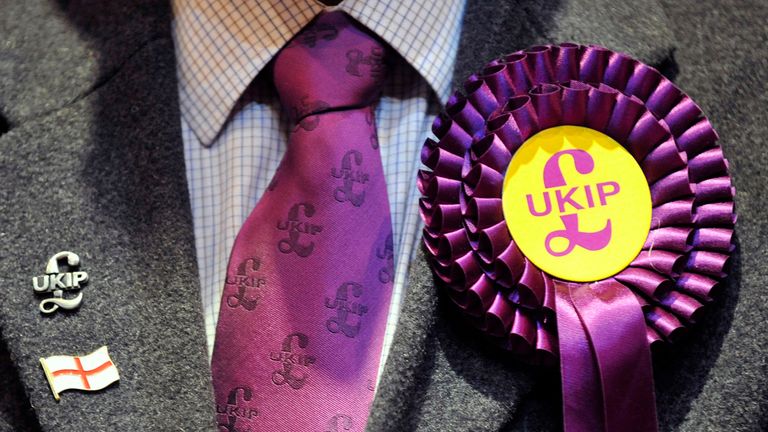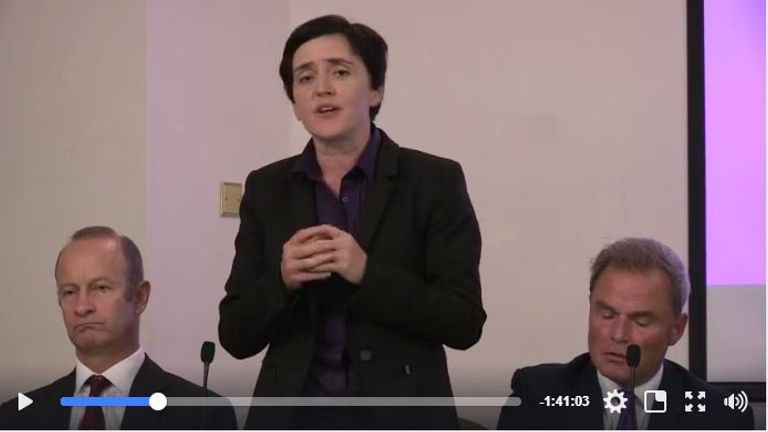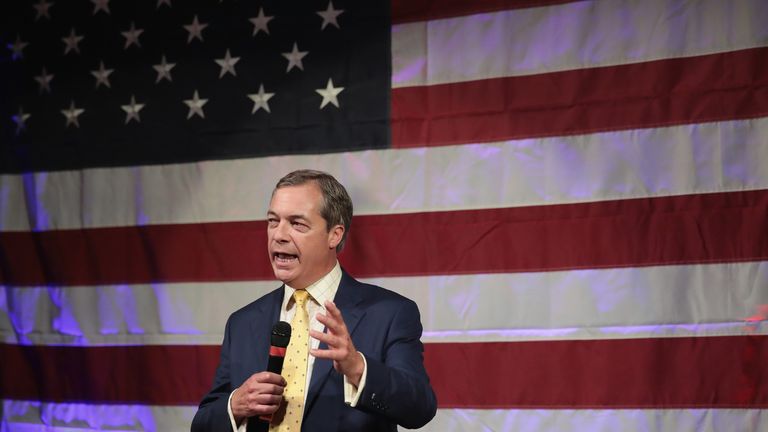UKIP's future depends on its choice of leader
The remaining UKIP faithful gather this weekend to solve the most potent of political pickles: In 2017, what's the point of UKIP?
Friday 29 September 2017 05:04, UK
UKIP...remember them?
The submarine of British politics: after being briefly very visible they've since sunk without trace. After winning over four million votes in 2015, the party imploded after the EU referendum, sliding to just over 600,000 votes and the political weeds.
Many electors seemed to feel that the clue was in the name: now Britain is leaving the EU they could safely return to two major parties with which they had greater historical and emotional connection.
So as what's left of the UKIP party faithful gather in Torquay this weekend for their annual conference, the party will be seeking to solve the most potent of political pickles: In 2017, what's the point of UKIP? Whoever they choose will tell us much about the party's answer.
After Paul Nuttall resigned following the calamitous election result, there was no obvious successor. Over the course of the summer, party members have been choosing from the following runners and riders:
:: Peter Whittle
He is former leader Paul Nuttall's deputy and probably the candidate who is best known (although that's not saying much). He's a member of the London Assembly and probably the party establishment choice (what's left of it).
He was UKIP's candidate for the London mayoralty. Whittle was responsible for devising the party's election campaign stance to ban the burqa and sharia courts but is opposed to the very extremist elements which have been joining the party. Relatively unusually for a senior UKIP politician, he is also gay.
:: Anne Marie Waters
She has overtaken Whittle to become the favourite in the race. Waters actually started her political life on the hard left of the Labour party but has now embraced UKIP. She is a hardline anti-Islam campaigner and the founder of "Sharia Watch UK". She was also deputy leader of the UK arm of Pegida, the far-right (you guessed it) anti-Islam group.
She's committed to taking the party down a route which is almost entirely focused on anti-Islamic sentiment, describing the religion as "an expansionist, political, totalitarian and supremacist faith, commanded to world domination". Almost all of the other candidates have pledged to quit the party if she wins and she is undoubtedly the candidate most feared by traditional kipper insiders.
:: John Rees-Evans
He is a party activist and rather eccentric; an advocate of direct democracy in the party and beyond. He caused controversy earlier in the summer when he came up with a wheeze to pay dual-nationals up to £9,000 a piece to leave the UK. The cost of such a scheme could be north of £12bn which Mr Rees-Evans suggests we fund by slashing the foreign aid budget. Aside from this he is perhaps best known for regaling the viewers of the Daily Politics with a tall tale about how "a gay donkey raped my horse".
:: David Kurten
He is a member of the London Assembly and UKIP's education spokesman. He would be Britain's first ethnic minority of leader of a major party (or at least, an erstwhile one). The party's former Deputy Chair Suzanne Evans said that he was not fit to lead the party recently, after he made comments which likened homosexuality to child abuse. But he is well liked within the party and thought to be one of the more competent candidates.
:: Jane Collins MEP
She is home affairs spokeswoman, MEP for Yorkshire and a former parliamentary candidate. She was at the centre of a "Stop Waters" effort which saw a number of other candidates drop out of the race and fall under her banner in an attempt to ensure that the anti-Waters vote wasn't split. Earlier this year she was ordered by the High Court to pay libel costs after she accused several Labour MPs of knowing about child sexual abuse in the town but failing to act. She describes herself as a "progressive libertarian".
:: Henry Bolton
A former police officer in the Thames Valley Police and soldier, he was the party's candidate for Kent Police and Crime Commissioner in 2016. A Faragist who says he wants to "resume Nigel Farage's legacy by restoring UKIP's relevance and authority". He's warned that the party "could easily slip towards the ideals of national socialism" if it chooses the wrong candidate.
Raging at the heart of all this is the civil war between the party's two camps, whose ideas don't really cohere into a single unit, especially without the sticking plaster of opposition to membership of the European Union.
On the one side there is the libertarian wing, led by people such as Whittle and Collins who'd like to see a back to the future approach, returning the party to its earlier roots of a low-tax, small state prospectus.
On the other side there is Waters, who essentially would like to turn the party into one of cultural and economic nationalism, protectionism and almost entirely focused on issues of race and anti-Islam, essentially a new BNP.
As a party source told me, whichever side wins will lead to the other walking out: "they cannot co-exist". For example, almost all of the party's 20 MEPs have said they would quit if Waters comes out on top.
To be clear, it's not as if any of the candidates are great friends of multiculturalism. Almost all of them have made anti-Islamic comments at one time or another. But if Waters wins the party will likely focus on little else and will make the leap to the farthest-flung reaches of the political spectrum's outer edges.
The party is now so fragmented and depleted and the electorate so small that the race could be anyone's. Although most expect Waters or Whittle, don't be surprised to see an outsider sneak in, much as UKIP itself once did.
Whoever triumphs will be the party's fourth leader in a year. Whoever loses might be leader of a new party in even less time than that.








